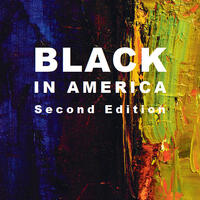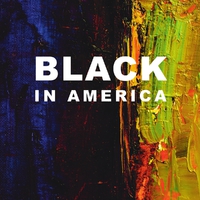-
Title
-
Black in America: A Broadview Topics Reader
-
This edition
-
"Black in America: A Broadview Topics Reader." Ed. Jessica Edwards. Peterborough, ON: Broadview Press, 2018. 544 pp.
-
Table of contents
-
[Items not included in the 2nd edition (2024) are marked with an asterisk inside parentheses (*)]
Contents by Historical Chronology
Contents by Subject
Contents by Genre and Rhetorical Category
Suggested Pairs and Groups
● Jessica Edwards / Preface
● Olaudah Equiano / from The Interesting Narrative of the Life of Olaudah Equiano
● Sojourner Truth / Speech Delivered at the Akron, Ohio, Convention on Women’s Rights, 1851
● Frederick Douglass / from Fourth of July Oration
● Harriet Jacobs / from Incidents in the Life of a Slave Girl, Seven Years Concealed
● Jordan Anderson / Letter from a Freedman to His Old Master
● Anna Julia Cooper / from A Voice from the South (*)
● Booker T. Washington / Speech Delivered at the Cotton States and International Exposition, 18 September 1895
● James Weldon Johnson / Lift Every Voice and Sing
● Ida B. Wells / from Lynch Law in America
● Ida B. Wells / from Southern Horrors: Lynch Law in All Its Phases
● Pauline Hopkins / from Hon. Frederick Douglass
● W.E.B. Du Bois / Of Our Spiritual Strivings [from The Souls of Black Folk]
● W.E.B. Du Bois / from Of Mr. Booker T. Washington and Others [from The Souls of Black Folk]
● The Niagara Movement / The Niagara Movement’s Declaration of Principles, 1905
● Claude McKay / If We Must Die
● Langston Hughes / The Negro Artist and the Racial Mountain
● Alice Dunbar-Nelson / The Negro Woman and the Ballot
● Zora Neale Hurston / How It Feels to Be Colored Me
● James Baldwin / Stranger in the Village (*)
● James Baldwin / If Black English Isn’t a Language, Then Tell Me, What Is? (*)
● Frantz Fanon / from The Wretched of the Earth
● Martin Luther King Jr. / Letter from Birmingham Jail
● Malcolm X / from The Autobiography of Malcolm X
● Bayard Rustin / “Black Power” and Coalition Politics (*)
● Shirley Chisholm / Equal Rights for Women
● Alice Walker / In Search of Our Mothers’ Gardens: The Creativity of Black Women in the South
● Audre Lorde / The Transformation of Silence into Language and Action
● Audre Lorde / Uses of Anger: Women Responding to Racism
● Howard Zinn / from A People’s History of the United States (*)
● bell hooks / Coming to Class Consciousness [from Where We Stand]
● Malcolm Gladwell / None of the Above: What I.Q. Doesn’t Tell You about Race (*)
● Barack Obama / A More Perfect Union
● Chimamanda Ngozi Adichie / The Color of an Awkward Conversation (*)
● Michelle Alexander / from The New Jim Crow
● Adilifu Nama / from Super Black: American Pop Culture and Black Superheroes
● Mia McKenzie / White Silence (*)
● Alisha Knight / from “To Aid in Everyway Possible in Uplifting the Colored People of America”: Hopkins’s Revisionary Definition of African American Success
● Bettina Love / from Hip Hop’s Li’l Sistas Speak: Negotiating Hip Hop Identities and Politics in the New South
● Darnell L. Moore / Black, LGBT, American: A Search for Sanctuaries
● Ta-Nehisi Coates / from The Case for Reparations
● Ta-Nehisi Coates / from The First White President
● Roxane Gay / The Politics of Respectability
● Claudia Rankine / from Citizen: An American Lyric
● Bryan Stevenson / from Just Mercy
● Nikole Hannah-Jones / School Segregation: The Continuing Tragedy of Ferguson
● Teju Cole / A True Picture of Black Skin (*)
● Frances Gateward and John Jennings / from The Blacker the Ink: Constructions of Black Identity in Comics and Sequential Art (*)
● Dawn Marie Dow / The Deadly Challenges of Raising African American Boys: Navigating the Controlling Image of the “Thug”
● Brent Staples / The Movie Get Out Is a Strong Antidote to the Myth of “Postracial” America (*)
● Mitch Landrieu / Truth: Remarks on the Removal of Confederate Monuments in New Orleans
● Cameron Glover / No, Black-Only Safe Spaces Are Not Racist
● Zadie Smith / Getting In and Out: Who Owns Black Pain?
● Jonathan Capehart / Taking a Knee with Colin Kaepernick and Standing with Stephen Curry against Trump
● Wall Street Journal Editorial Board / The Politicization of Everything: Everybody Loses in the Trump-NFL Brawl over the National Anthem (*)
● Audra D.S. Burch / from The #MeToo Moment: After Alabama, Black Women Wonder, What’s Next? (*)
● Shanita Hubbard / Russell Simmons, R. Kelly, and Why Black Women Can’t Say #MeToo
● Carvell Wallace / Why Black Panther Is a Defining Moment for Black America
Biographical Notes
Permissions Acknowledgments
Index
-
Publisher's description
-
● ""Black in America" samples the breadth of non-fiction writing on African American experiences in the United States. The emphasis is on twenty-first-century authors such as Ta-Nehisi Coates, Claudia Rankine, and Roxane Gay, but a substantial representation of vitally important writing from other eras is also included, from Olaudah Equiano and Sojourner Truth to James Baldwin, Audre Lorde, and Alice Walker; in all there are over 50 selections. Selections are arranged by author in rough chronological order; the book also includes alternative tables of contents listing material by thematic subject and by genre and rhetorical style. A headnote, explanatory notes, and discussion questions facilitate student engagement with each piece" (publisher's website).
● The website also includes blurbs from three scholars of African American literature and culture:
● "An accessible and lively collection, "Black in America" is an ethical reader of African American culture, experience, and writing—forming a continuous dialogue about protest, place, and rhetorical frameworks of expression in relation to raced experiences of America. Arranged chronologically for simplicity, the anthology also provides alternative tables of contents to suggest dynamic pairings of texts. From James Baldwin to Teju Cole; Anna Julia Cooper to bell hooks; from anthems to hip hop; Black Power to Black Panther; Malcolm X to #MeToo, historically significant texts are brought into the company of contemporary writers, thinkers, and events in this "au courant" collection. It will be a highly useful anthology for the twenty-first century classroom"—Noelle Morrissette, U of North Carolina at Greensboro
● ""Black in America" is an intellectually exciting anthology of analytical, persuasive and personal essays, biographical excerpts, blogs, film reviews, and other writings on the African American Experience in the United States. It is designed for teaching undergraduate students in Writing and Rhetoric courses and students in Introduction to Black Studies courses. The anthology features contemporary works, such as Ta-Nehisi Coates’s ‘The Case for Reparations’ and Carvell Wallace’s ‘Why "Black Panther" Is a Defining Moment for Black America,’ as well as canonical old favorites from the Black Intellectual Tradition, such as W.E.B. Du Bois’s critique of Booker T. Washington and Zora Neale Hurston’s ‘How It Feels to Be Colored Me.’
“Each selection is preceded by a captivating introduction, and at the end of each selection, there are thought-provoking questions to prompt students to critically engage the ideas in the text as well as to focus students on the text’s rhetorical strategies and stylistics. Given the global diversity of the twenty-first century, some questions—about comparative cultural practices, for instance—are directed to international students. There are brief, succinctly written explanatory footnotes, and there is a companion website with background information about particular phrases and ideas alluded to in a given selection. To accommodate diverse teaching emphases, there are three versions of the anthology’s Table of Contents: one arranged by historical chronology; one by genre and rhetorical category; and the third by subject. Indeed, the editorial team seems to have thought of everything! For teacher-scholars in Composition Studies and African American Studies, "Black in America" is the text you have been waiting for"—Geneva Smitherman, Michigan State U
● ""Black in America" is an outstanding contribution that takes the reader on a journey from the mid-nineteenth century to present day, through the lives and experiences African Americans in the United States. This critical work is a tribute to those who sacrificed their own welfare and often their lives to resist oppression and promote positive change"—Sheila T. Gregory, Clark Atlanta U
-
Item Number
-
A0457
 Black in America (2nd ed.)
Black in America (2nd ed.)
 Front cover
Front cover Black in America (2nd ed.)
Black in America (2nd ed.)